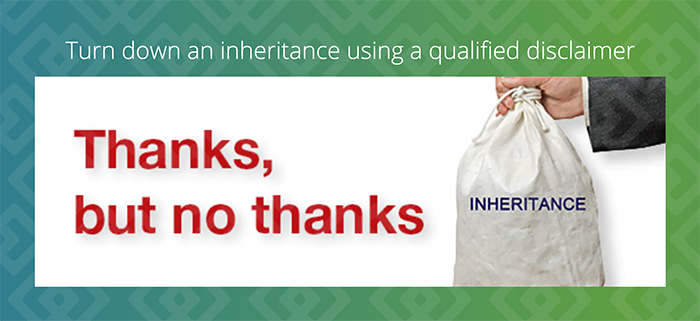If you are about to receive an inheritance from a family member, you can use a qualified disclaimer to refuse the bequest. The assets will then bypass your estate and go directly to the next beneficiary in line. It’s as if the successor beneficiary, not you, had been named as the beneficiary in the first place.
But why would you ever look this proverbial gift horse in the mouth? For beneficiaries who already have large estates themselves, using a legally valid disclaimer can save gift and estate taxes, often while redirecting funds to where they ultimately would have gone anyway.
Estate planning benefits
Federal estate tax laws are fairly rigid, but a qualified disclaimer offers some unique flexibility to a forward-thinking beneficiary. Currently, the gift and estate tax exemption can shelter a generous $11.18 million in assets for 2018. By maximizing portability of any unused exemption amount, a married couple can effectively pass up to $22.36 million in 2018 to their heirs free of gift and estate taxes.
However, despite these lofty amounts, wealthier individuals, including those who aren’t married and can’t benefit from the unlimited marital deduction or portability, still might have estate tax liability concerns. Plus, the gift and estate tax exemption is currently scheduled to drop roughly by half in 2026.
By using a disclaimer, you avoid having the exemption further eroded by the inherited amount. Assuming you don’t need the money, shifting it to the younger generation without it ever touching your hands not only allows it to bypass your taxable estate, but saves gift and estate tax for the family as a whole.
5 legal requirements for qualified disclaimers
To be legally valid as a qualified disclaimer, the following five requirements must be met:
- The disclaimer must be made in writing and signed by the disclaiming party.
- The disclaimer must be irrevocable and unqualified.
- The disclaimant (that is, the person disclaiming) must not accept the interest or any of its benefits.
- The disclaimer must be delivered to the person or entity charged with the obligation of transferring the assets no more than nine months after the date the property was transferred or nine months after a disclaimant who is a minor reaches age 21.
- The interest must pass to a person other than the disclaimant without any direction by the disclaimant. Bear in mind that the spouse of the deceased is specifically authorized to be the person receiving the property by virtue of a disclaimer.
Look before you leap
Using a qualified disclaimer can provide flexibility if your net worth is already high and you’re in line for an inheritance from your parents or other loved ones. Before taking action, consult with us to help ensure a disclaimer is right for you and, if it is, that it meets the five legal requirements.


